Finding the best pipe for underground water line is very important if you want to deliver great efficiency and stability. On top of that, a good underground water pipe needs to be very resistant as well. These pipes are designed to create a powerful water line, so they need to be extremely efficient, easy to use, but also adaptable to your needs. Generally, the main focus for water line pipes used underground is longevity.
In general, plumbers will use various pipe types so they create an underground water line. Things like the site condition, the elements, but also the overall location can affect the performance of an underground water pipe. When you choose underground pipes, these are things to consider since you want them to be reliable and very efficient.
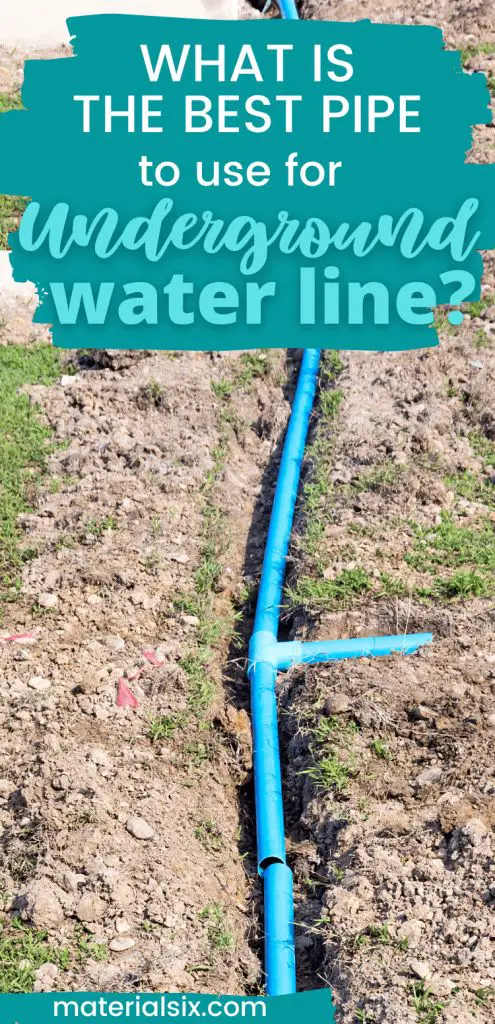
Best Underground Water Line Pipes
1. PEX Tubing
Also known as cross-linked polyethylene, this material is plastic, and it can be great for both an underground water line and above-ground solutions too.
It’s similar to a thick hose, yet at the same time, this is the best pipe for underground water line because it’s very flexible. You can stretch and bend it so it can work flawlessly in many different situations.
Another thing we like about PEX Tubing because it can withstand high pressure, elements, and even chemical damage. You can also connect it with compression fittings, and not glued fittings. If you need a material that can be used underground for potable water, this is a very good pick.
2. Copper Piping
Copper can be a great material for water supply pipes due to many reasons. One of them is the fact that it’s corrosion-resistant, but at the same time, it’s also a very rigid pipe.
There’s a universal application code, and that makes it versatile and a pleasure to use. That being said, copper can be more expensive when compared to other materials.
Related: How to Connect PVC to Copper – Preparation and Execution Tips
3. CPVC Pipes
CPVC may be the best pipe for underground water lines because it withstands very high pressure and temperature levels. The chlorinated polyvinyl chloride is much better than PVC in this regard.
You can use it for cold and hot water systems, depending on the situation at hand. That being said, the CPVC Pipe approval varies based on the community. It can also be used above ground, making it a novel, versatile, and reliable solution.
4. PVC Pipes
PVC Pipes can be used above and below ground as well. You can find a multitude of PVC pipes on the market, but the most common option is white, either with a thin wall or a thick wall. One thing to note about PVC Pipes is that they are connected via gluing, which is not exactly the simplest and most efficient solution.
This uses a process named solvent welding. Gluing is not exactly the most glamorous and efficient solution, but it does help. Many think this is the best pipe for an underground water line because not only is it affordable, you can also use it for a variety of solutions. You will find municipalities that are ok with using PVC for water transport. That being said, some of them are restricting things like PVC pipes just to the irrigation systems.
5. HDPE Pipes
HDPE Pipes or High-Density Polyethylene are considered to be one of the top solutions if you want to have an underground water pipe. The reason behind that is these pipes are not toxic at all. They are also tasteless, so the water taste and chemical composition is not affected in any way. That’s why many people consider them a green material, versatile, and very adaptable to your own requirements.
With that in mind, the High-Density Polyethylene pipes can last up to 70 years, and they are also very affordable. That makes them the ideal underground water line pipes, and the great thing is that they don’t need any maintenance. Plus, they do have corrosion and crack resistance, which is very important. Another advantage is that you have great flexibility, primarily due to them being lightweight.
6. Galvanized Piping
Galvanized pipes are basically iron/steel pipes that were treated with zinc. The zinc coating is important since it helps provide corrosion and rust resistance. One thing to note is that they are very good for water lines, as they are not deteriorating in time. They are also a lot less expensive when it comes to copper pipes.
Maybe the best thing about them is that galvanized pipes can actually last for over 100 years. That makes them ideal for underground water lines. On top of that, no major maintenance is needed, they work really well and you will find them suitable even for the longer and more complex water lines, which is very helpful.
7. Brass piping
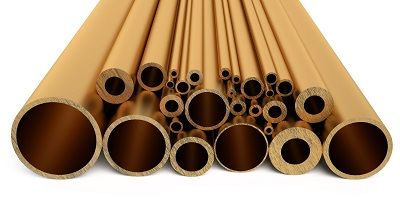
Should you use brass pipes as the best option for an underground water line? It depends on multiple factors. In a similar fashion to the galvanized pipes, brass is also delivering heat and corrosion resistance. Brass is not contaminating your water, so you will not have to worry about any issues. That’s why this is the best pipe for underground water line in many people’s minds.
With that in mind, brass is not very common for underground pipes because there are lighter weight and more affordable materials out there. Depending on your needs, it can still be very efficient for smaller-scale water lines you can have underground.
How Deep Should You Bury Water Lines?
It depends on the state. But normally you want to make sure that you want to have the waterline below the frost line. For a mid-range state, the depth is 36 inches. Calling 811 or the “call before you dig” line is very important because you can figure out the right depth and also avoid any possible issues that might arise. For states in the south the frost line depth is under 6”, but for those in the high up north, it can be up to 48 inches.
Check this infographic below.
Which is the ideal pipe size for a water line?
The great thing about water lines is that you don’t have a specific pipe size, you can adapt based on your needs. On average, people go for the ¾ inch pipes because they deliver enough water pressure and are not very big. However, you can up things a bit and go for the 1-inch pipes if this is the major water line.
Needless to say, the bigger the water line pipe, the more water pressure you will receive. So it all depends on your needs. Going for larger water pipes is a good idea if you need this as a potable water source. However, if you just need this for your sprinklers, then the water pipes can be a lot smaller.
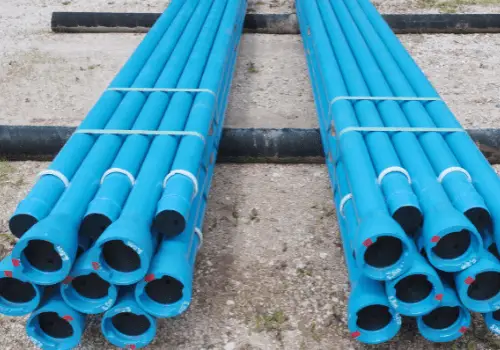
Some people think that lowering the pipe size will boost the water pressure. What this does is increase the water speed. However, volume is important, not the overall speed. That’s why you want to address this wisely, and it can indeed offer the efficiency and quality that you need. We recommend focusing on the volume and not speed. This is why the larger piping systems tend to be a lot better in general. But as we mentioned earlier, it depends on your needs.
How Do You Insulate Underground Water Lines?
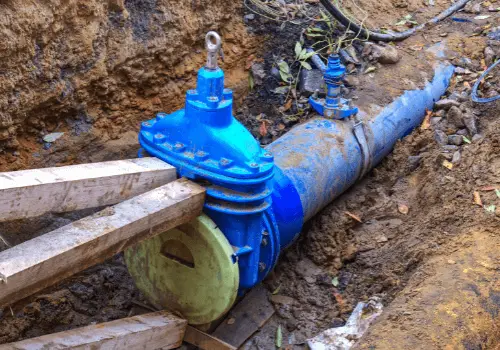
You can go with either watertight or non-watertight insulation. The first one was created to deliver better protection against freezing. What this does is it fees the waterline via a larger pipe, then that pipe is filled with insulative material. This way the Underground Water Lines work a lot better and you have more efficiency.
For nonwatertight insulation, you must dig the pipeline trench with 3 more inches down, then you must add 3 inches of gravel. What this does is helps drain the water from Underground Water Lines. Line this with some heavy plastic sheets and cut the foam board insulation. Place this around the waterline. Around 4” of insulation will do fine, and after that, you wrap the plastic sheets around your waterline and tape it properly. Fill with soil and it will work great!
Should you worry about your water pipes freezing underground?
Theoretically, the fact that water pipes are underground, means that they are a bit protected against the elements, including freezing. However, if you live in a colder climate, pipes can freeze and eventually burst. It’s not common, but it can happen. That’s why many people consider things like insulation because it can help prevent freezing. It’s not a sure-fire solution, but it certainly helps.
Does the water system length matter?
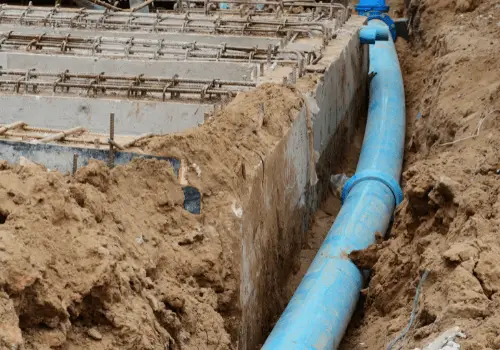
Some materials like brass are more suitable for smaller water lines. They are more expensive, and they don’t offer the utmost efficiency when you have a large system in mind. This is why you want to think about the material pros and cons. Also, depending on where you live, some materials are a lot easier to access and more efficient.
Pricing is certainly important too. If you have a large water line in mind, you do want to keep costs as affordable as possible. This is why it makes a lot of sense to focus on the overall features of the piping system, then pick what works for you.
One thing to keep in mind is that every water line piping type has its own durability. Some of these systems are very durable, others less so. It makes a lot of sense to keep in mind all these pros and cons, including durability, when you choose the right piping system for water lines. Not only does it help save time and effort, but it also means you can avoid looking for a replacement early on.
Conclusion
As you can see, finding the best pipe for an underground water line is not that complicated. There are many different options to consider, each one with its own benefits and downsides. It’s a good idea to look at the pipe features and think about installation and overall costs. This will help you narrow down the most reliable and specific option which works for you.
Additionally, the waterline length is another major factor to keep in mind. It will help eliminate concerns while making sure you receive the utmost benefits and value. You should keep in mind all these ideas, and take your time as you find the right products. It’s a great idea, and it will make it easier to identify what type of underground pipes are ideal for your area. Also, try to check the local regulations, in some cases, you will have recommended water piping types depending on things like weather, underground structure/composition, and many other similar criteria.
Even if most of these pipe types can be suitable for underground water lines, experts suggest you use PEX and HDPE pipes because they are the most dependable. Not only do they resist corrosion and rust, but at the same time, they deliver much better efficiency. You can also insulate them with ease if you live in a colder climate.
More from Materialsix:





